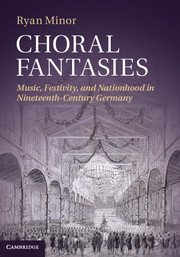In an exclusive interview, Dr Ryan Minor talks about the challenges he faced in writing his latest book, Choral Fantasies.
Most histories of nineteenth-century music portray ‘the people’ merely as an audience, however you have put them, the chorus, at centre stage. What inspired you to take this view? And what challenges did you face in doing so?
The inspiration, I suppose, was righteous indignation. When I started in musicology, just out of high school, I realized that choral music and choral singing-two things that had been hugely important not only for me but for virtually everyone I knew who was interested in music – were habitually ignored in musicology. In fact, to call 19th-century choral music the country cousin of more prestigious genres like the symphony or opera is probably an upgrade, at least as far as canonical music histories and performance repertories are concerned. So initially I was just annoyed. I did dally with some other topics and interests in grad school, but ultimately I realized that not only my interests, but also for lack of a better word my conviction, lay in teasing out the “birth” of the choral movement. I was curious why it became such a phenomenon in the nineteenth century, what so many peoples’ investment with it could have been, and also, I suppose, what its limitations were.
The nineteenth-century was the heyday of German bourgeois liberalism. How does this play out in the musical culture of the time?
In many ways it simply boils down to participation: the opportunity to sing music, to take part publicly, in musical life. The music history textbooks that emphasize an enormous gap between professionals and amateurs in 19th-century music are really only talking about certain genres of instrumental music. In fact, there was a hugely important and overlap between a participatory musical culture on the one hand, and “advanced” art music on the other, and that was choral music. And it’s precisely at this intersection where all the ideals of bourgeois liberalism found a musical voice.
How does Choral Fantasies fit within your wider academic interests and research?
I’ve always been interested in how music participates in a much broader political and public sphere. In many ways, this book is a direct outgrowth of that interest. It’s not the only one, however. I’ve also written a fair amount on opera-my other hat, as it were-but that interest is similarly one that’s focused on the social, cultural, and political worlds that the art form imagines. My next book is all opera, and goes later historically, but readers will certainly recognize some of the same core interests.
Where do you like to write?
Anywhere I can concentrate-which unfortunately does not include cafes or other public spaces. I really do need a hermetic seal to get anything written. Thinking, though, takes place anywhere. I often have insights at the gym, of all places.
Typewriter, word processor or pen?
Word processor for the writing, but plain pen and paper for working out ideas and organization. I’m afraid I wouldn’t know what to do with a typewriter, though I imagine cursing would be involved.
What is on your ‘Desert Island’ playlist?
Actually nothing from this book! Whoever said you have to love the music you write about is wrong. I’m very much interested in the music I discuss, but it would have to be an awfully generous playlist-or the guarantee of a very speedy rescue from the desert island-for me to include most of the music in Choral Fantasies. Pride of place would go to Mozart and Wagner, both of whom I could put on endless loop and very much enjoy my deserted island.
 Dr Ryan Minor is the author of ‘Choral Fantasies’ (out now). He is Associate Professor of Music at the State University of New York at Stony Brook. His research focuses primarily on the musical and political culture of nineteenth- and early twentieth-century Germany, with special emphasis on opera, choral music and music’s participation in the public sphere. He has published widely on Wagner and serves as an Associate Editor of ‘The Opera Quarterly’.
Dr Ryan Minor is the author of ‘Choral Fantasies’ (out now). He is Associate Professor of Music at the State University of New York at Stony Brook. His research focuses primarily on the musical and political culture of nineteenth- and early twentieth-century Germany, with special emphasis on opera, choral music and music’s participation in the public sphere. He has published widely on Wagner and serves as an Associate Editor of ‘The Opera Quarterly’.
Latest Comments
Have your say!